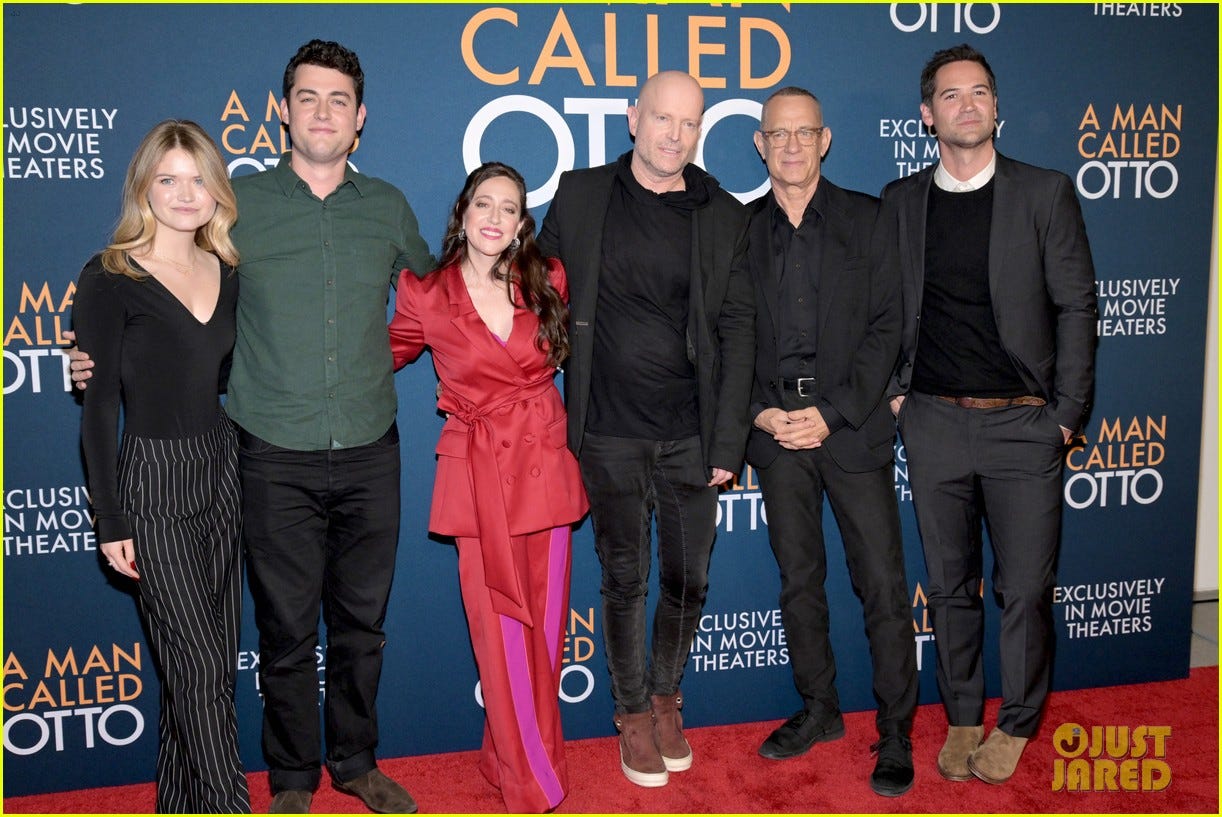"A Man Called Otto" And The Power of The Flashback
Crying And Laughing at The Most Inappropriate Moments

I’m not gonna even try to summarize this movie because my friend T.C. from The Inverted Gentleman already wrote out a comprehensive and wonderful synopsis of “A Man Called Otto” on his blog and I highly recommend you check it out.
Not only does he do an amazing job giving a quick summary of this 2 hour 6 minute movie, he also speaks on the overused and tacky tropes of something called the “DIE Ideology” in filmmaking and media, which I found enlightening in spite of being overall depressing :D
Think of any kind of diversity checkbox high-up executives could want you to stuff into your movie for the façade of diversity, representation, and inclusion: that is DIE Ideology.
T.C. shows which of the checkboxes this movie ticks off and after seeing his list, I can’t help but agree. To how you take that tidbit of information is up to you, but I appreciate the knowledge nonetheless.
This movie made me laugh at the weirdest times, but it also had me straight up crying at the weirdest times as well. I didn’t have many expectations for this movie, but it kept me emotionally engaged and surprised with how well it tapped on those sympathetic nerves.

Flashbacks
T.C. from The Inverted Gentleman eloquently phrases how the flashbacks are “instead little sips crosscut with present action,” which is a beautiful explanation for how well they utilize this storytelling device. Otto’s (Tom Hanks) memories are constantly punctuated by raucous demands to be in the present and the metaphor of life refusing to let him go.
Exposition

Despite flashbacks running the very real risk of interrupting the flow of the story and info-dumping on the audience, Otto’s flashbacks are quite tasteful for a grumpy old man.
Flashbacks are a great storytelling device to explain what happened in the story before we started following the story. It cuts between the present and the past and we get a cohesive story and background for the enigma that is our protagonist.
We learn about his history, his now-deceased wife Sonya (Rachel Keller), and why he is the way he is. Which does not justify his cranky and rude attitude, but it definitely explains it and understanding that makes him a character that we begrudgingly root for.
Otto is a man determined to hold onto the past, and the use of flashbacks here strongly ties in to his age and the allure of warm memories in lieu of the coldness of his present life.
Humanizing

We learn so much about Otto through his flashbacks. In the present, we get a bitter old fool who’s so stuck in his ways and angry at the entire world around him for being incompetent nincompoops.
With the flashbacks, we see his gentler side as he meets his wife and the struggles of not fitting in, and becoming an engineer. All of which he loses or has lost by the beginning of the movie.
We don’t necessarily watch his descent into being an angry and old man, we see the highlights, key moments of his life that defined him, as all good movies do.
But I get it. I really do. In a world where he once knew where he stood with his wife, to lose all of that in so short a time must be aggravating and depressing.
We are met with the Old Otto and Young Otto (Truman Hanks) and they are two vastly different people. There are similarities, in how they both vehemently protect their neighborhood like angry chihuahuas on short leashes, their awkward mannerisms, his methodical and then sometimes angry outbursts as well as that kindness hidden in his all-too-big heart.
His core is the same. But that youth, of being hopeful and happy, is lost in his adult self and we can’t help but wonder, how did that happen? When?
Is that all there is at the end of the line?
Sonya

Everyone needs a Sonya in their life.
But I’m not sure people ever truly find their Sonya.
She is everything Otto is not, but she meshes well with him and complements all that he lacks. Kindness is something they share (but Old Otto seems determined to rub that out of himself), but while Otto holds it in, she gifts it to the world.
We learn she was a schoolteacher, disabled due to a terrible accident, unable to have children, a loving and considerate person. Not saying you need to be all of the above to be considered a good person, but
In spite of her hardship, she kept an open heart for both her and Otto. And when she died, it’s like she took that piece with her.
Every suicide attempt of Otto’s to join her is punctuated by the memory of her, an action, a line of dialogue from the past that parallels in the present to keep Otto from offing himself.
Almost like she is keeping him from doing the unthinkable.
Sonya grounded Otto, and her absence is felt so strongly by Otto that we as his passive audience also feel her painful absence in the present he is forced to live through.
Her memory is what is keeping him back, his fear of forgetting her smell or her voice or her love.
But her memory is ultimately what reminds him that though she may be gone, she will always be with him.




A deeper analysis than I could have mustered. I was impressed how well the flashbacks were handled in this film.